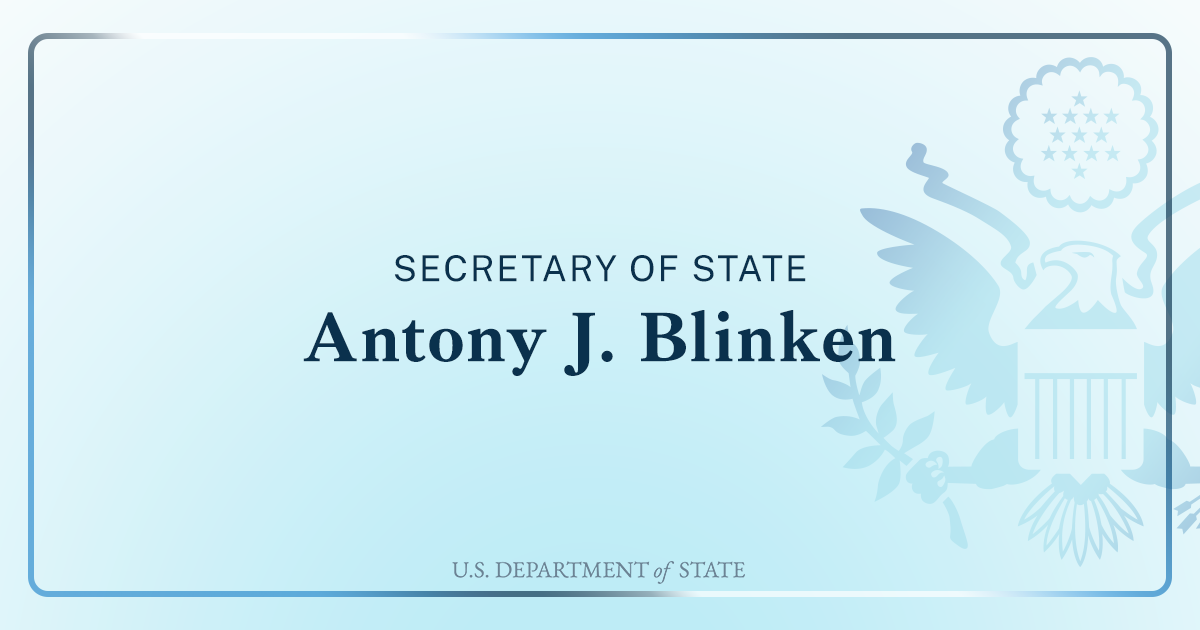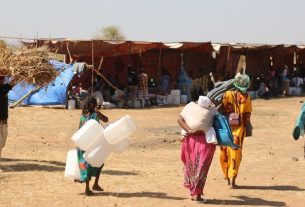SECRETARY BLINKEN: Thank you. Good afternoon. Please have a seat. And welcome to the State Department.
President Ruto, First Lady, it is an honor to welcome you here to the State Department. Evan and I are so delighted to host this lunch with Vice President Harris and Second Gentleman Emhoff.
Madam Vice President, we know your leadership in this administration. The American people know your leadership in this country. I can attest to your leadership around the world as a powerful force for American diplomacy, and it is always a great pleasure to be with you and to work with you. Thank you. (Applause.)
We’re so grateful today to be joined by representatives of other nations, partners from across Kenya and the United States, colleagues from Congress, particularly the Congressional Black Caucus. Thank you for being here with us today. (Applause.)
And I’d also like to start by thanking everyone who has made this wonderful meal possible, including Margaret Nyamumbo, who’s an entrepreneur whose coffee export business is helping women farmers in Kenya and also delivering extraordinary coffee, which may come in handy at some point during this toast if you need a little bit of help. (Laughter and applause.) Thank you, Margaret.
So as some of you have heard over the last few days, this year the United States and Kenya are celebrating a milestone: Six decades ago – and just a few months after Kenya won its independence – our two countries formally established diplomatic relations.
Yet our people had already forged deep ties. In one another, many Kenyans and Americans saw reflections of their own history – their own fights for freedom and self-determination.
And that’s what brought two young men together in the 1950s.
In 1956, Tom Mboya, a rising political leader in Kenya, came here to the United States. He was on a speaking tour about his nation’s struggle for independence. Backstage at an event in New York, he met Bill Scheinman, a young American entrepreneur who supported his cause. They hit it off immediately.
They decided to continue their conversation at a restaurant – and they ended up talking all night.
Mboya shared his efforts to assist rising Kenyan leaders who were going to college. Scheinman wanted to help.
In the coming years, they started a foundation to support Kenyans studying in the United States. The group identified outstanding students, they rallied donations, they chartered flights to bring them to U.S. colleges and universities.
Eventually, Mboya convinced a young American senator by the name of John F. Kennedy to provide support. Soon, this program became known as the Kennedy Airlifts.
This initiative brought hundreds of Kenyans and other East Africans to the United States over the years. Many became trailblazers in medicine, academia, civil society, government, the media. A number worked alongside Mboya, one of Kenya’s founding fathers.
Mboya and Scheinman themselves became friends for life. Mboya was the best man at Scheinman’s wedding. Years later, when Scheinman died, he was buried in Kenya, next to Mboya.
President Ruto, you once said that “nations are driven forward and changed by individuals, ordinary men and women who believe [that] they can make a difference… [and] can change the status quo.”
Mboya and Scheinman shared that belief and acted on it.
So does President Ruto. His own story – rising from a kid who went to school barefoot until he was 15 years old, earned money selling chickens by the side of the road, to become president of his country – is a testament to that very idea.
And Mr. President – I think and hope that you’ve felt these past few days the gratitude that we have for our partnership and for your leadership.
Ben Franklin looks down upon us, our first diplomat, and he was known for his aphorisms. And one of them many of us know is: Well done is better than well said. Anyone who has the benefit of working with and listening to President Ruto knows that he excels at both.
Countless other Kenyans and Americans have also dedicated themselves to doing their part. And for generations, our people have continued to collaborate, to advance our shared values, our hopes, our visions for the future.
Today, our countries are working together to grow inclusive economic opportunity, to shape cutting-edge technology in Silicon Valley and the Silicon Savannah.
We’re supporting the transition to clean energy, improving our capacity to prevent, to detect, to treat infectious diseases.
We’re working to counter terrorism, to resolve conflicts, to help restore stability to some of the most insecure places, including Haiti. These are areas where President Ruto has demonstrated critical personal leadership, not just in the region but around the world.
Our citizens, our communities, our civil societies are also working every day to strengthen our democracies – to bring ourselves a little bit closer to the free, open, just, and equitable societies that we both aspire to be.
Long after the airlifts, we continue to grow the ties between our countries and between our people. Earlier this week, President Ruto and President Biden announced a new educational exchange program focused on STEM, named after the Kennedy-Mboya Partnership.
When Kenyans and Americans collaborate, they’re not just leading on the issues that matter to our people; they’re leading on issues that matter to people everywhere.
That’s the story of Octavia Carbon. Its team of Kenyan engineers, scientists, climate change experts are building machines that pull carbon out of the atmosphere. Their goal is to become the first carbon removal country – company, excuse me – in Africa to lower the cost of this critical technology.
The Octavia team started working from a kitchen table. Now, they’ve created a machine that can absorb as much carbon in a year as 2,000 trees.
When that technology is ready to deploy, Octavia Carbon will team up with a U.S. company to store all of the extracted C02 in the ground. And together, they’ll help make our shared planet more sustainable for generations to come.
I’m told that in the Octavia Carbon warehouse – the place where they’re actually building and testing these prototypes right now – there’s a mural, and it’s got two portraits on it.
One depicts the company’s namesake – the great Black American writer Octavia Butler – whose science-fiction stories challenge readers around the world to imagine a different future for our societies.
The other portrait is of one of the greatest marathon runners of all time – the great Kenyan athlete Eliud Kipchoge – who once said that he lives for moments when he gets to challenge the limits.
That’s the spirit that animated Tom Mboya, Bill Scheinman more than 60 years ago. They challenged the limits of their time in pressing for more free, more just societies in both of our countries.
It’s the same spirit that unites Kenyans and Americans today: the determination, the creativity, the audacity to chart a path beyond what we believe is possible; to not only imagine a better world, to make it and to make it together.
So, please join me in a toast: To every limit that our people have already surpassed, to the limits that we will exceed together.
SECRETARY BLINKEN: And now, it’s my great honor to present to you the Vice President of the United States. (Applause.)
(The Vice President makes remarks.)
PRESIDENT RUTO: Madam Vice President, Secretary Blinken, distinguished ladies and gentlemen, good afternoon.
AUDIENCE: Good afternoon.
PRESIDENT RUTO: It gives me tremendous pleasure to come back to this great building. I was here two years ago, and today in my state visit to the United States we meet again to celebrate 60 years of relationship between two friendly nations, the United States and Kenya. Our relationship, based on a firm foundation of the values we share and believe in – values of freedom, democracy, rule of law, inclusivity, and equality. They were as present and meaningful many years ago; they are so today.
And as I come to the conclusion of this state visit, I am persuaded beyond any doubt that the relationship between the United States and Kenya and Africa is now on to a new pedestal. (Applause.)
I thank President Biden in a very special way for helping us reshape, re-engineer, and write a new narrative for our continent. We all believe in a Nigerian proverb that says, “Until the lion learnt to write, all stories favored the hunter.” (Laughter and applause.) We have decided that we are going to write our own story. (Applause.) And we started this last year.
When I convened the first-ever Africa Climate Summit, the conversation, the narrative, has always been this continent of conflict, trouble, disease, poverty, yet that is not the story of Africa. Africa is a continent of tremendous opportunity: the largest reserves of energy, renewable energy, resources; 60 percent of the world’s arable uncultivated land; 30 percent of mineral wealth, global mineral wealth, including those that are necessary for energy transition; the youngest continent, which will produce 40 percent of the world’s working or workforce by 2050, and where a quarter of the world’s population will be living, providing the world’s biggest single market. In short, Africa is a rich continent and a continent of opportunity. (Applause.)
I am very happy that President Biden and this visit is giving us the opportunity to rewrite and recalibrate the relationship between this great superpower and our continent. And I am very proud that among the things we’ve agreed are not just about Kenya and the U.S., it’s about Kenya and the continent of Africa: from what we are doing around climate action; what we are doing around the financial architecture of the world to make it fairer, to make it much more sensitive, to make it much more agile; and to make it possible for many African countries and those in the Global South, many developing countries, to access concessional resources for us to manage the affairs of our people, and that no country will spend more money on paying debt or on managing climate-induced crisis than they do on spending on health, education, or social service. (Applause.)
I must commend the leadership of the United States. President Biden and the many other leaders I met at the Hill, including the Black Caucus, including the leadership – the joint leadership of the House and the Senate, and all of them shared the same views with us: that it’s time for a new relationship, to build a new relationship between our continent and the United States as we encourage the United States to take leadership on making sure that together we can have a freer, a safer, a healthier, and a much more prosperous globe for all of us.
Finally, we discussed many issues that today I find will give us new opportunities, will open new frontiers, and will enlarge the horizon for collaboration in making sure that we deal with the challenges that we all face of insecurity, of stability; challenges of debt and other financial challenges; but also give ourselves the opportunity to explore the tremendous opportunities that exist for collaboration in exploiting our huge reserves and assets, using our human capital, and connecting assets that we have in our continent to technologies from the U.S., to financial reserve from the U.S., and creating a win-win outcome that works for the U.S., works for Kenya, and works globally for all humanity. I thank you. (Applause.)
Let me request you to raise our glasses as I propose a toast: to the long-lasting relationship, the good health, prosperous engagement, stability and prosperity for the people of the United States and the people of Kenya. Cheers.



